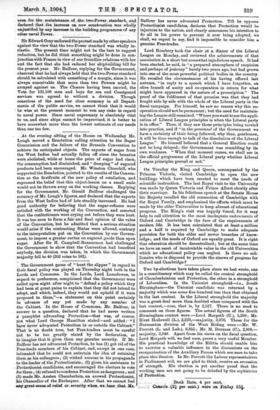At the evening sitting of the House on Wednesday Mr.
Lough moved a Resolution calling attention to the Sugar Commission and the failure of the Brussels Convention to achieve its anticipated objects. The exports of sugar from the West Indies had actually fallen off since the bounties were abolished, while at home the price of sugar had risen, the consumption had diminished, and "dumping" of sugared products had been encouraged. Mr. Winston Churchill, who supported the Resolution, pointed to the results of the Conven- tion as the firstfruits of the new policy of retaliation, and expressed the belief that this object-lesson on a small scale would not be thrown away on the working classes. Replying for the Government, Mr. Gerald Balfour challenged the accuracy of Mr. Lough's figures, and declared that the exports from the West Indies had of late steadily increased. He had good authority for believing that the sugar-refiners were satisfied with the working of the Convention, and asserted that the confectioners were crying out before they were hurt. It was too soon to form a fair and final opinion of the value of the Convention, but he admitted that a serious situation would arise if the contracting States were allowed, contrary to the interpretation put on the Convention by our Govern- ment, to impose a greater surtax on sugared goods than upon sugar. After Sir H. Campbell-Bannerman had challenged the Government to show that the Convention had benefited anybody, the division was taken, in which the Government majority fell to 40 (202 votes to 162).










































 Previous page
Previous page